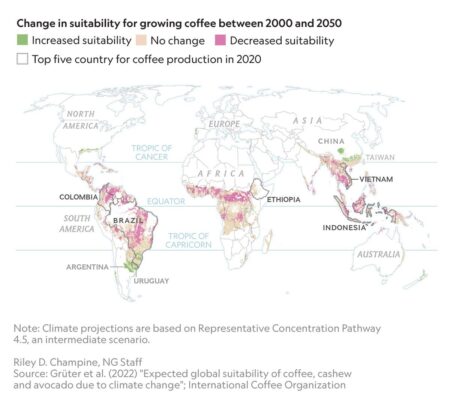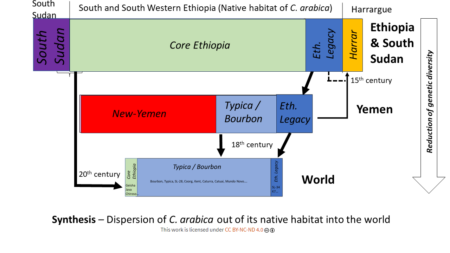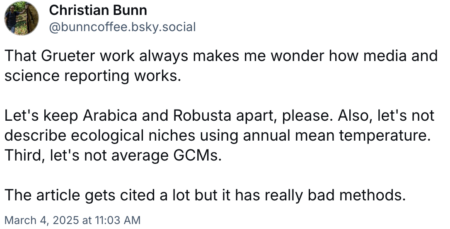- Conventional agriculture increases global warming while decreasing system sustainability. The global warming potential of conventional grain agriculture has increased x8 from 1961-2020, whereas sustainability index has decreased x3. Whatever are we to do?
- Adoption of improved crop varieties limited biodiversity losses, terrestrial carbon emissions, and cropland expansion in the tropics. Crop improvements from 1961–2015 resulted in less cropland expansion, lower greenhouse gas emissions and fewer extinctions. Right, so what we need is more of the same?
- Yield growth patterns of food commodities: Insights and challenges. “The same” has meant that yield growth for dozens of crops is not slowing down. At least in the global aggregate. At least for now. At least for calories. So no resting on laurels out there!
- Governance and resilience as entry points for transforming food systems in the countdown to 2030. Especially as regards governance and resilience.
- Poverty and yield effects of CGIAR maize varieties in smallholder farming systems of Zambia. CGIAR breeders are definitely not resting on their laurels, but it looks like that won’t be enough.
- Global meta-analysis shows action is needed to halt genetic diversity loss. CGIAR and other breeders are going to need that genetic diversity that is being lost. Whatever are we to do?
- How can biodiversity strategy and action plans incorporate genetic diversity and align with global commitments? We could make better, more inclusive biodiversity conservation plans, for one thing. Which include agricultural biodiversity.
- Exploring the role of technology in the trade-off between biodiversity and poverty alleviation across countries. It would be good if those better plans included technology adoption.
- Liberalization of animal genetic resources trade and local animal productivity outcomes: A natural experiment. And yes, genetic diversity is a technology. Sort of.
A pressing victory
Jeremy was thrilled — thrilled I tell you — at some recent news from Irish Seed Savers Association. And, frankly, so was I. It’s all in his latest newsletter.
Thrilled to see that the apple juice produced by the Irish Seed Savers Association took the Community Food Award at the Irish Food Writers Guild shindig last week. ISSA put together and looks after the National Collection of Heritage Apple Trees on its organic farm near Clare. The winning apple juice celebrates the diversity of the orchard and serves as a reminder both of the history of Ireland’s apples and ISSA’s commitment to sustainability.
If you would like to know more, the ETP archives contain two episodes on the apple collection and the work of the Irish Seed Savers Association, which may explain my enthusiasm.
Digging up the pig
I’m sure you enjoyed Jeremy’s fascinating conversation with Jordan Rosenblum on how the pig and the eagle diverged as the history of Jewish dietary law and custom played out. Which means you’d probably welcome another helping of Prof. Rosenblum. Well, you’d get that, and much more, in the excellent brief summary of the deep history of the animal — the pig that is, not the eagle — in the Levant coincidentally just out in Archaeology Magazine. Prepare to be surprised:
…the inhabitants of the earliest cities of the Bronze Age (3500–1200 b.c.) were enthusiastic pig eaters, and that even later Iron Age (1200–586 b.c.) residents of Jerusalem enjoyed the occasional pork feast.
What makes a good coffee… map?
Thanks to Christian Bunn for throwing some shade on the work underlying the map of putative changes in coffee suitability that I so blithely shared yesterday. Maps can be both pretty and also the result of suspect methodology, I guess.
Save our coffee!!!
The American Geographic Society had a very informative post about coffee prices on Facebook a few days back. I don’t really want to link to it, but I’m sure you can find it if you want. Anyway, here’s the text.
Coffee prices have hit a 50-year high due to a combination of rising costs of production, supply chain disruptions, and climate change–related declines in crop yields. Coffee plants are sensitive to changes in precipitation and temperature, and recent droughts in Brazil and Vietnam resulted in poor harvests. Coffee companies are passing on the extra costs to customers, with the average retail price of ground roast coffee increasing 15 percent in American cities in the past year and peaking at over $7 a pound. As climate change will continue to threaten coffee harvests in the years to come, projected to shrink the land available for coffee cultivation by half, prices are expected to keep rising.
They also helpfully link to three recent supporting articles in the NY Times, The Independent and on ABC News.
And they reproduce a map from a National Geographic article from a couple of years back.

Social media as it should be done.
And since we’re on the subject, there are some very cool resources on coffee diversity on the website of Christophe Montagnon, a renowned expert on the crop. For example, I really like this summary of the global history of arabica.

We’re going to need those resources — and indeed that diversity — if we want to keep drinking coffee.
